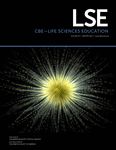Alternative Realities: Faculty and Student Perceptions of Instructional Practices in Laboratory Courses
Abstract
Curricular reform efforts depend on our ability to determine how courses are taught and how instructional practices affect student outcomes. In this study, we developed a 30-question survey on inquiry-based learning and assessment in undergraduate laboratory courses that was administered to 878 students in 54 courses (41 introductory level and 13 upper level) from 20 institutions (four community colleges, 11 liberal arts colleges, and five universities, of which four were minority-serving institutions). On the basis of an exploratory factor analysis, we defined five constructs: metacognition, feedback and assessment, scientific synthesis, science process skills, and instructor-directed teaching. Using our refined survey of 24 items, we compared student and faculty perceptions of instructional practices both across courses and across instructors. In general, faculty and student perceptions were not significantly related. Although mean perceptions were often similar, faculty perceptions were more variable than those of students, suggesting that faculty may have more nuanced views than students. In addition, student perceptions of some instructional practices were influenced by their previous experience in laboratory courses and their self-efficacy. As student outcomes, such as learning gains, are ultimately most important, future research should examine the degree to which faculty and student perceptions of instructional practices predict student outcomes in different contexts.



